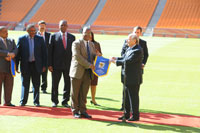The majestic Soccer City Stadium, the venue for the 2010 FIFA World Cup opening and closing ceremonies, and the International Broadcast Centre (IBC), the event's media central facility, were officially opened and handed over by local authorities to FIFA today, Wednesday, 2 June 2010, in Johannesburg.

Photos by Enoch Lehung/City of Joburg.
click to enlargeSome observers say today's ceremony marks history in South Africa and shames Afro-pessimists who believe that Africa will never rise from the ashes of poverty, armed conflict and underdevelopment.
Five-star stadium
"This is a five-star stadium that can only perhaps be compared with London's Wembley and I am happy to be here to unveil the plaque of such a beautiful flagship," FIFA President Sepp Blatter told journalists, as the sun shone brightly over the 94 700-seat edifice, symbolising the dawn of hope on a nation that has known so much pain.
CAF president Issa Hayatou, sports and recreation minister Makhenkesi Stofile, Gauteng premier Nomvula Mokonyane, Johannesburg mayor Amos Masondo, Local Organising Committee chairman Irvin Khoza and Johannesburg head of 2010 projects Sibongile Mazibuko also attended the ceremony.
Blatter added: "This flagship belongs not only to South Africa and Africa, but also to the rest of the world. This is a FIFA legacy and I am happy to witness such a historical day. I say this is a cup of hope, enjoy it and enjoy the life."
Soccer City Stadium is indeed a place full of history in the sense that this is a venue where former President Nelson Mandela addressed the crowd of over 100 000 people, just three days after his release from prison in February 1990.
Battled against all odds
Since then, SA has battled against all odds to become - after more than four decades of apartheid - Africa's economic powerhouse and a place of hope and optimism, which in May 2004 was rewarded with the right to host the world's biggest soccer show. That was the day when Afro-pessimism soared, prompting many in the West to say FIFA made a huge mistake to host the world cup in Africa, a place they describe as a bastion of poverty, violent crime, war and HIV.
Gauteng premier Mokonyane said: "This day signifies a milestone for SA, as we show the world that we are ready and shame those who doubted our capacity to host this event. We were not deterred by their criticism but we decided to let our action do the talking."
Gauteng is Africa's fourth-largest economy and contributes 34% to SA's GDP (Gross Domestic Product), and 7% to the continent's GDP.
Soccer City Stadium (former FNB Stadium), branded the 'African calabash' and located in Nasrec near Soweto, south of Johannesburg, will host several number of games involving teams such as Brazil, Argentina, Ghana, Cote d'Ivoire, the Netherlands, Korea Republic, Denmark and SA.
Getting formal training
Mayor Masondo, whose city will host 15 games, said the construction of Soccer City has created 17 200 jobs and culminated in over 800 people getting formal training in the fields such as brick-laying and building. He also said an amount of R1.6 billion has spent on over 850 contractors during the stadium's construction.
After unveiling the stadium's plaque, officials as well as the legion of local and international journalists moved to the IBC, where a ribbon was cut to signal the official opening of the ultra-modern media facility.











































